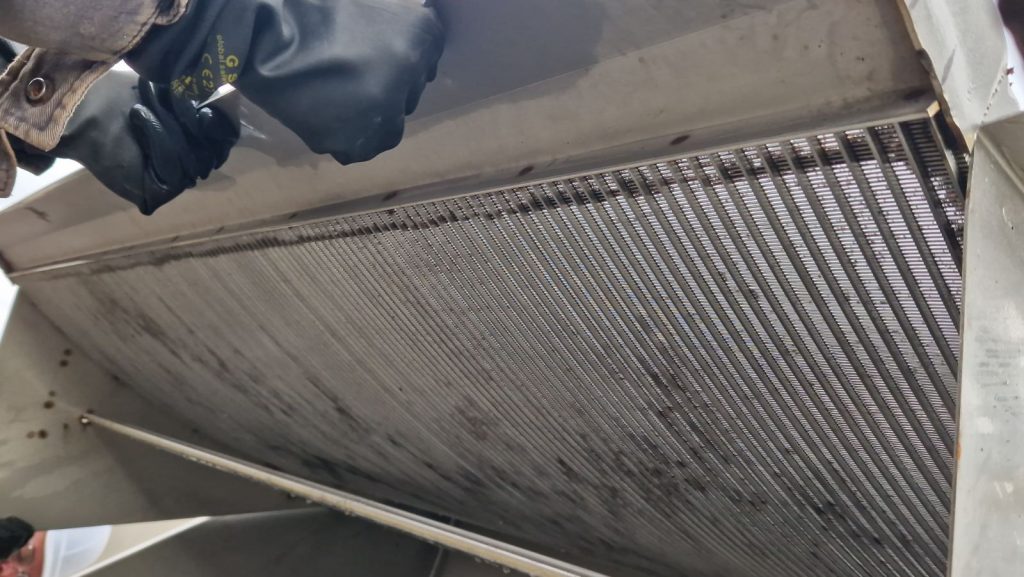Our long-standing customer from the food industry consulted us for the development of a sustainable, technical and economic solution for the mechanical treatment of wastewater. The reconstruction of the primary stage for the existing industrial wastewater treatment plant was necessary. The client needed an additional technological step for mechanical purification, which would reduce the passing amount of undissolved substances in the technological scheme, with minimal and investment costs
The client
The client is one of the largest industrial enterprises for the extraction of primary products in the food industry. The company has dozens of innovation centers, producing and distributing food, feed and industrial products.
Wastewater management in the enterprise is subject to particularly strict environmental protection standards. The waste water goes through a process of mechanical and biological purification before being discharged. The specific technological scheme consists of a mechanical purification stage for the removal of larger pollutants, biological purification, sedimentation and discharge to a water intake.
Selected technology
In order to satisfy the technical requirements of the project, we proposed an ecological and sustainable solution, namely a static gravity sieve, type “Coanda”. The static gravity sieve is a suitable choice for the mechanical removal of undissolved substances, with filter openings between 0.25 mm and 3.00 mm. Relying mainly on gravity, the sieve is an effective solution for separating solid particles in wastewater. The incoming water flow is distributed in the upper part of the screen, whose inclination relative to the horizontal decreases progressively from top to bottom approximately between 65º and 45º.
Static screens are free-standing modular designs, easy to install, with no motor or moving parts to wear. Thanks to the innovative technological solution, the Coanda grill does not need an electrical supply. It has low maintenance costs and zero operational costs.
Static gravity sieves have a wide industrial application:
- Industrial and urban sewage treatment plants;
- Food industry;
- Paper industry;
- Ceramic productions.
Our technology solution
To achieve the desired purification parameters, ATAMIQ supplied a fine static gravity sieve with a design capacity of up to 50 l/s, with filtering openings of 0.5 mm. To achieve the desired flow rate, an inlet with a nominal diameter of DN 250 and the following overall dimensions of the facility – height 1553mm, width 2050mm, length 1225mm are provided.
The sieve is made of AISI 316 stainless steel, according to the composition of the incoming wastewater. In addition, the use of stainless steel enables a long service life of the facility due to its high resistance to abrasive impurities and corrosion.
#Know-How
ESG directives enable companies to increase their sustainable practices at every stage of the technological production process. Increasing competitiveness in an environmental aspect, our customers increasingly pay attention to the management of their resources. Each treatment plant can be modernized by:
- Energy efficient equipment and systems – Treatment plants can reduce energy consumption by using highly efficient motors, pumps and other equipment. This can help minimize greenhouse gas emissions and lower operating costs.
- Chemical-free water treatment – Some water treatment methods involve the use of chemicals that can be harmful to the environment. Alternative methods for disinfection/retreatment of drinking water and wastewater such as ultraviolet (UV) irradiation, ozone treatment and reverse osmosis are chemical-free and environmentally friendly.
- Water conservation and reuse – Treatment plants can reduce water waste by reclaiming and reusing wastewater. This can help conserve water resources and reduce the volume of wastewater released into the environment.
- Renewable energy – Treatment plants can also generate renewable energy by installing solar panels, wind turbines or biogas plants. By using renewable energy sources, treatment plants can reduce their dependence on fossil fuels and contribute to the fight against climate change.
Contacts:
If you also have a wastewater treatment project, do not hesitate to contact our specialist at sales@atamiq.com or at +359886163199



